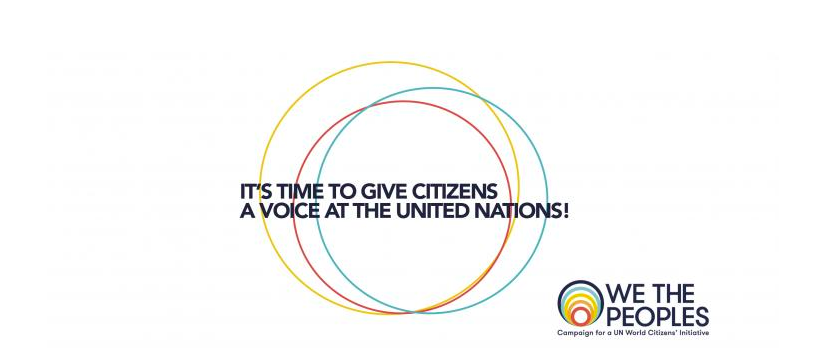It’s time for citizens to have a voice at the global level. With complex challenges that are increasingly global in nature, we need global solutions. A UN World Citizens’ Initiative gives citizens a way to shape political priorities on the global level.
What is it? How does it work?
Through the UNWCI citizens may have a say at the UN level. This would happen when geographically representative self-organized citizens’ committees launch an initiative in support of a given proposal. If they receive the support of more than five million people from different world regions in a certain time frame, the General Assembly or the Security Council have to put the proposal on their agenda and give committees’ representatives the chance to present their arguments.

Visit UNWCI - HOW WILL IT WORK? to learn in detail how the initiative would work
Why is citizens’ input to the UN crucial?
Democratic governance should not only occur on the national level because challenges such as the COVID-19 pandemic, climate change and terrorism are transnational in nature and cannot be solved by a single state. Because much of the decision-making regarding global issues is taking place in the international realm, global institutions must take into consideration the preferences of the citizens they serve. Furthermore, the input of well-informed ordinary citizens would bring innovative ideas to support global decision-making. Citizens can bring issues on the UN’s agenda that are relevant across borders, but which were not prioritized before. They are the ones that experience daily the issues the UN is working on. Thus, they are the ones who can give the most accurate input on questions such as where and how resources should be allocated.
The Inspiration: The European Citizens’ Initiative
In many countries, some instruments allow citizens to provide input for consideration by the executive or legislative branch of government. Since 2012 in the European Union, there is the official instrument of a European Citizens’ Initiative (ECI) which gives citizens the right to submit a legislative proposal to the European Commission. The ECI was established mainly because of the democratic deficit that EU citizens were experiencing. In principle, the ECI enables everyday citizens to identify a problem, propose a solution and submit their proposal to the European Commission for review, based on the support of one million EU citizens. This has the potential to revolutionize citizenship participation at the highest political levels and represents the first and only transnational tool of participatory democracy that exists in the world. Civil society organizations have been inspired by the ECI and want in the same manner to bring more bottom-up influence to the UN through a UNWCI.
Why is UNWCI revolutionary and important?
Even though initiatives for citizens’ inclusion are present, as seen with the example of the EU which launched the ECI to close the democratic gap in the union, they are still limited on an international level. With a UNWCI citizens would have for the first time the opportunity to proactively bring the issues that matter to them on the international political floor. Subsequently, they would have the binding right to receive a response from world leaders. Bringing citizens closer to decision-making would make a genuine impact in a world with growing problems that transcend national borders and require the global cooperation of both states and citizens alike. A UNWCI would contribute to the creation of a citizen-based global political sphere, where certain global challenges and citizens’ concerns would no longer be neglected.
Watch our Webinar on the UN World Citizens' Initiative here:
< Back to the previous page Learn about a UN Parliamentary Assembly >



